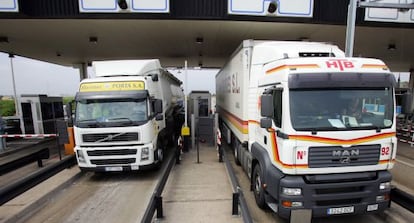Truckers in Spain concerned over plans to force them on to toll highways
Industry suspicious about government proposal to stop heavy vehicles using regular roads


Truck drivers are worried about a new plan by Spain’s government to force heavy vehicles off conventional roads and on to toll highways wherever possible.
The sector fears that the Public Works Ministry’s proposal will tack additional costs on to their business, since the government is only planning to subsidize 50 percent of the road tolls truckers will have to pay as a result.
Industry representatives are not certain that the shorter routes will save them enough on fuel to compensate for the new expense.
“We will not accept a ban on trucks on national roads,” said Dulsé Díaz, communications director for the Spanish Federation of Freight Transportation (CETM), an umbrella group for over 35,000 businesses. “They must have a free option.”
The ministry claims that the new regulations will improve road safety and reduce accident rates
There are around 310,000 commercial trucks circulating on Spanish roads, of which 220,000 are heavy vehicles, according to official figures.
The ministry claims that the new regulations will improve road safety and reduce accident rates.
But Díaz said responsibility for road safety should not fall exclusively to the trucking sector, which is already very aware of the need to follow road rules.
“We are not the main problem on the roads,” said Díaz, suggesting that the real motive for the proposal may be quite different.
Dulsé Díaz, trucking industry spokesperson
“We could for instance wonder whether what they really want is to encourage the use of toll roads,” he said, a reference to the fact that several Spanish toll road operators were brought to the brink of bankrupcty by the economic crisis, forcing the government to rush in with a bailout.
Ramón Valdivia, director general of the International Road Transportation Association (Astic), says it is too early to pass judgment on the plans. “We still need to know details such as the map of affected roads, and the underlying reasons for the change. For now, the way it’s being framed, we are not happy about it,” he said.
If it does go into effect, it will not be the first time that such a measure has been tried in Spain. Trucks used to make up 40 percent of traffic on the national N-II road in the Catalan province of Girona, but these vehicles are now obliged to drive on the AP-7 toll road.
Luis Montoro, president of the Foundation for Road Safety and Sustainable Mobility (Fesvial), said there are European studies proving that banning heavy vehicles from conventional roads reduces accident rates by between five and 15 percent.
Tu suscripción se está usando en otro dispositivo
¿Quieres añadir otro usuario a tu suscripción?
Si continúas leyendo en este dispositivo, no se podrá leer en el otro.
FlechaTu suscripción se está usando en otro dispositivo y solo puedes acceder a EL PAÍS desde un dispositivo a la vez.
Si quieres compartir tu cuenta, cambia tu suscripción a la modalidad Premium, así podrás añadir otro usuario. Cada uno accederá con su propia cuenta de email, lo que os permitirá personalizar vuestra experiencia en EL PAÍS.
¿Tienes una suscripción de empresa? Accede aquí para contratar más cuentas.
En el caso de no saber quién está usando tu cuenta, te recomendamos cambiar tu contraseña aquí.
Si decides continuar compartiendo tu cuenta, este mensaje se mostrará en tu dispositivo y en el de la otra persona que está usando tu cuenta de forma indefinida, afectando a tu experiencia de lectura. Puedes consultar aquí los términos y condiciones de la suscripción digital.








































